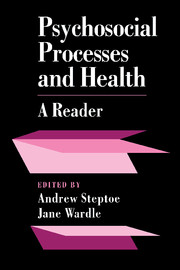Book contents
- Frontmatter
- Contents
- Preface
- Section 1 Life stress, social support and health
- Section 2 Psychophysiological processes in disease
- Section 3 Personality, behaviour patterns and health
- Section 4 Health practices and the modification of health risk behaviour
- A multivariate analysis of health-related practices: a nine-year mortality follow-up of the Alameda County Study
- The Health Belief Model and participation in programmes for the early detection of breast cancer: a comparative analysis
- Health promotion and the compression of morbidity 308
- Community education for cardiovascular health
- Primary prevention of cancer among children: changes in cigarette smoking and diet after six years of intervention
- Section 5 Coping with illness and disability
- Section 6 Behavioural interventions in medicine
- Index
The Health Belief Model and participation in programmes for the early detection of breast cancer: a comparative analysis
from Section 4 - Health practices and the modification of health risk behaviour
Published online by Cambridge University Press: 05 August 2016
- Frontmatter
- Contents
- Preface
- Section 1 Life stress, social support and health
- Section 2 Psychophysiological processes in disease
- Section 3 Personality, behaviour patterns and health
- Section 4 Health practices and the modification of health risk behaviour
- A multivariate analysis of health-related practices: a nine-year mortality follow-up of the Alameda County Study
- The Health Belief Model and participation in programmes for the early detection of breast cancer: a comparative analysis
- Health promotion and the compression of morbidity 308
- Community education for cardiovascular health
- Primary prevention of cancer among children: changes in cigarette smoking and diet after six years of intervention
- Section 5 Coping with illness and disability
- Section 6 Behavioural interventions in medicine
- Index
Summary
Abstract
Extravagant claims have been made about the power of the Health Belief Model (HBM) to explain both decisions to adopt patterns of health behaviour and to use preventive health services. However, studies where information on beliefs are collected before information on behaviour are not common. The analyses presented here are based on prospective studies examining how far the variables which make up the HBM predict attendance at (i) a class teaching breast self-examination and (ii) a clinic providing mammography. The results show that different dimensions of the HBM are amongst the best predictors of attendance at each of the different services although the overall variance explained by the HBM in both sets of analysis was small.
Introduction
Extravagant claims have been made about the power of the Health Belief Model (HBM) to explain decisions to use preventive health services [1] and decisions to adopt patterns of health behaviour [2, 3]. However, much of its support has come from studies where data on beliefs and behaviour are collected at the same time. These studies have shown strong correlations between beliefs and behaviour although it is difficult to judge if beliefs produce behaviour or vice versa as there is evidence to show that individuals sometimes rationalise their beliefs and feelings to fit with their behaviour [4].
The best way of testing if beliefs produce behaviour is to ensure that information about beliefs are collected before the behaviour occurs. The few prospective studies which do this have been less supportive to the HBM [5]. However, these prospective studies have also suffered from a fundamental weakness in that they have studied behaviour which is relatively common such as the use of dental services and where the prospective participants could have used the service previously. Thus, their beliefs may have been modified by their previous contact with the service. Studies examining the explanatory power of the Health Belief Model should ideally focus on use of a service which is relatively novel to the participants. However, if this is impractical, then some attempt should be made to allow for previous contact with the service when the relationship between beliefs and behaviour is examined.
- Type
- Chapter
- Information
- Psychosocial Processes and HealthA Reader, pp. 290 - 307Publisher: Cambridge University PressPrint publication year: 1994
- 1
- Cited by



